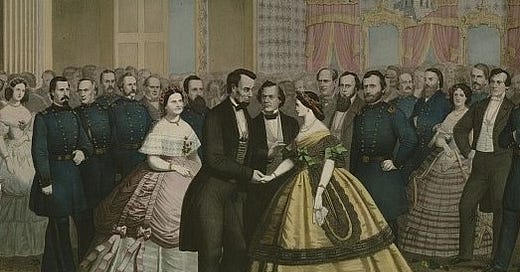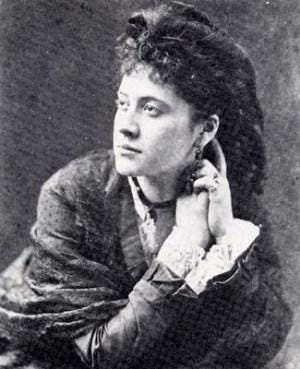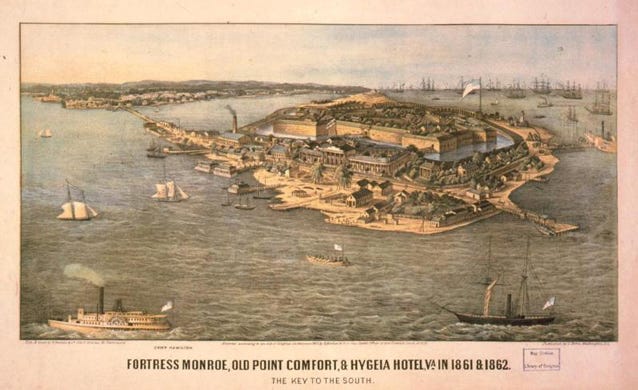MARIA AMPARO RUIZ DE BURTON is considered to be the first Mexican-American author and the first Mexican-American author to write in English (1872: Who Would Have Thought It?).
She was born to an aristocratic family in La Paz, Baja California— but hungered for a larger life. During the Mexican-American War (1845-1848), 15-year old Maria Amparo experienced the invasion of her town by American troops led by dashing U.S. Army Captain Henry Burton, and saw her chance. Burton was smitten; Maria Amparo promptly refused to go through with her arranged marriage to a wealthy older ranchero— and along with her mother she accompanied Captain Burton to his new post in Northern California. At seventeen she married him, and the couple bought Rancho Jamul, near San Diego, and began a family.
In 1859, Burton was ordered east, taking Maria Amparo and their two children with him. Maria Amparo plunged into the top levels of Washington society—she was finally in her element.
Read After the Gold Rush from the beginning:
After the Gold Rush, Chapter 30
March, 1861, Washington, DC
Maria Amparo Ruiz de Burton
Maria Amparo’s first few months in the East were nearly unbearable: a miserable time spent in Vermont in the stifling, humiliating company of Henry’s extremely Yankee family. They took no bother to conceal their contempt for her raza. She had even overheard female relatives calling her “that little nigger” and lamenting that Henry was throwing himself away.
Instead of responding, she had written it all down, every insult, every slur, every contortion of their faces, mocking them back on paper. One day, somehow, she would make them pay for each word.
It was a blessed relief to be free of them when Enrique took up his post at Fortress Monroe.
The bastion fort was a fascinating place to explore: huge, six-sided, surrounded by a moat, with a strategic location that protected the entire Chesapeake Bay and Potomac River regions, and defended the water approaches to the cities of Washington and Baltimore.
That proximity to both cities also meant a constant, sophisticated social life. The children were in boarding school in Georgetown, and the Burtons were frequent guests at the teas, dinners, balls, and theater excursions that continued unabated even as war loomed.
In Washington, in stark contrast to Vermont, Maria Amparo found herself received with interest and pleasure—and she reveled in her new reputation as the lovely, lively young wife of gallant Captain Burton. Avid reader that she was, she was well aware of the romance of their courtship; she deftly played up the most thrilling, forbidden aspects of the Burtons’ story to eager listeners.
But far more important to Maria Amparo than the socializing was the sudden access to powerful people: the congressmen, diplomats, and military officers she now met and conversed with regularly. She built these connections up like savings in a bank, knowing when she returned to California she might be able to use them to secure her beloved Rancho Jamul.
She met President Buchanan before he left office, and on March 8, 1861, attended the social event of the year: the inauguration of Abraham Lincoln.
Afterward, she wrote to Don Vallejo:
Well, the inauguration of Mr. Lincoln has passed without problem and he has given his first public reception without having been assassinated as was expected.
Mrs. Lincoln and I have become good friends. But the state of the country continues in agitation and the danger of war is ever present…
In truth, she did not consider Mary Todd a friend. She found Mrs. Lincoln manipulative and quite obviously deceitful of her husband. But she well understood how it felt to be an intelligent woman dismissed and denigrated by the men around her. She could not blame Mrs. Lincoln for using the only power accorded to her.
There was another important consideration. The president had no women in his circle; Maria Amparo did not expect she would be able to befriend him. Mary Todd’s influence over Lincoln could be made to pay off for the Burtons.
And pay off it did. Within mere months of arriving in Washington, Maria Amaparo scored a coup:
Executive Mansion, June 1, 1861
Honorable Secretary of War
My dear Sir:
Mrs. Capt. Burton is very desirous that her husband may be made a Colonel. I do not know him personally; but if it can be done without injustice to other officers of the Regular Army, I would like for her to be obliged.
- Yours truly, A. Lincoln 1
As Maria Amparo desired, and as the president spoke, it was done.
Why subscribe?
After the Gold Rush is currently available only online. Subscribe to get full access to all current chapters, photo and source material links, and the website.
Letters and dialogue from the letters of Maria Amparo Ruiz de Burton






